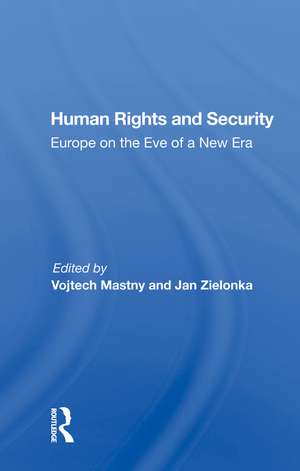Human Rights And Security: Europe On The Eve Of A New Era
Editat de Vojtech Mastnyen Limba Engleză Hardback – 7 iun 2019
Preț: 764.20 lei
Preț vechi: 1027.40 lei
-26% Nou
Puncte Express: 1146
Preț estimativ în valută:
146.32€ • 152.36$ • 121.40£
146.32€ • 152.36$ • 121.40£
Carte tipărită la comandă
Livrare economică 14-28 februarie
Preluare comenzi: 021 569.72.76
Specificații
ISBN-13: 9780367015893
ISBN-10: 0367015897
Pagini: 282
Dimensiuni: 146 x 229 mm
Greutate: 0.45 kg
Ediția:1
Editura: Taylor & Francis
Colecția Routledge
Locul publicării:Oxford, United Kingdom
ISBN-10: 0367015897
Pagini: 282
Dimensiuni: 146 x 229 mm
Greutate: 0.45 kg
Ediția:1
Editura: Taylor & Francis
Colecția Routledge
Locul publicării:Oxford, United Kingdom
Cuprins
Preface -- Introduction: Human Rights and Security from the French to the East European Revolution -- Human Rights and International Security -- Security, Human Rights, and East-West Relations: Theoretical Bases of the Linkage -- Human Rights, International Security, and the Crisis of Communism -- A Time for Linkage? Western Leverage for Human Rights and Security in Eastern Europe -- Human Rights and the Policy of Leverage and Linkage: The Lesson of the Helsinki Process -- Human Rights and East-West Relations -- Dilemmas in Human Rights Foreign Policy: The Case of the Netherlands -- Human Rights and the Security of States and Societies -- Old and New Soviet Thinking on Human Rights -- Perestroika, Freedom, and the Rule of Law -- Ethnic Rights as Human Rights: The Case of the Baltic States and Hungary -- Human Rights in a Multiethnic State: The Case of Yugoslavia -- Democratization in Eastern Europe: The Hopes and the Risks -- Human Rights in the Transition from Authoritarian to Pluralistic Regimes -- Conclusion: Human Rights and Security in a New Europe?
Descriere
Inquiries into the relationship between security and human rights are of very recent vintage. They have long been hampered by political scientists' predilection for political "realism." From that perspective, there seemed little doubt that power comes first and any human rights but a poor second. As wishful thinking turned into reality during the Eastern European revolutions of 1989, the limitations of such shortsighted realism became apparent. This book examines the causes and consequences of the emerging new relationship between security and human rights. It is divided into two parts, which deal respectively with security and human rights and their relationship to states and societies. What is the theoretical linkage between security and human rights? How has this linkage evolved within the context of East-West relations? What was the particular role of the Helsinki process in shaping this evolution? How do these issues affect the difficult transition from dictatorship to pluralism in countries facing the challenge of ethnic, economic, and social dislocation? The contributors to this volume seek to deepen our understanding of the forces that brought about the collapse of communism in Europe, and they explore the broader implications of change for the emerging post-cold war international order.
